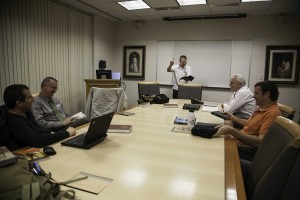
Amid the uproar from religious activists who fear that the Department of Defense will tighten its grip on religious expression in the armed forces, local military members say strict proselyting regulations are nothing new.
Conservative pundits from the Christian Post and Fox News have decried the Pentagon’s information session this month with the Military Religious Freedom Foundation, an organization that is alleged to hold hostile sentiments for Evangelical Christians.
The foundation, on the other hand, claims they are simply asking the Obama administration to more strictly enforce a non-proselytizing rule, a policy that includes every military member, including chaplains, in response to allegations that military officials at the Air Force Academy were inappropriately encouraging religious participation among non-religious cadets.
The resulting controversy prompted the DOD to clarify its position earlier this month.
“Service members can share their faith), but must not force unwanted, intrusive attempts to convert others of any faith or no faith to one’s beliefs,” the DOD said in a release.
The DOD’s recent clarifications come as no surprise to member of Utah’s military chaplain community, who say such a statement is on par with the military’s stance on religion up until now.
“This issue is an old hat for us,” said Clay Anstead, Utah National Guard chaplain.
As a chaplain, Anstead explained that he is there solely to help the soldiers, and that being a chaplain is a selfless duty.
“In the work environment, if you expect to have mutual understanding, you can’t impose on someone, it’s the golden rule,” Anstead said. “When I was called to be a Chaplain, I was told not to proselytize. For a Mormon, genetically that is challenging. Sharing our religious beliefs is in our DNA, that we promote the kingdom. … The chaplain is a religious figure, but the chances are slim that even 20 percent of the people he teaches are of the same faith… he serves the needs of the soldier.”
Chaplains are required to be impartial toward all faiths as they travel the world with troops far from their hometowns.
“As … you go to a place far away and there’s no location or opportunity for worship … the military chaplain helps provide and maintain an environment wherein all feel able to worship in the way that they are most comfortable,” Anstead said. “It is interesting that our duty has changed just a bit over the years. I must be completely respectful of solders’ beliefs, and also respect a lack of any given solder’s beliefs.”
Brigham Young University has offered a chaplaincy graduate program since 2008. Courses from various disciplines including marriage, family and human development; marriage and family therapy; and religious education. LDS Church Headquarters offers a cooperative hand in the program, which is aimed to train chaplains for service in a pluralistic setting.
“We teach the potential chaplains in our program to deeply appreciate other faiths,” said Richard Bennett, dean of religious education at BYU. “They are taught to be a counselor and advisor without proselytizing.”
Bennett said exposure to other faith leaders is critical in students’ development.
“Each summer, we have seven or eight religious leaders from different faiths to sensitize our chaplain candidates to the needs of other faith-based members of the military, so that we are able to be sensitive to their religious values, and to their different faith traditions to be a blessing to them within their own faith,” Bennett said. “This summer they’ll be educated by Buddhist priests, the director of religious life at Westminster College, the President of the Reformed Church of America and an Episcopal bishop.”
Hank McIntire, spokesman for the Utah National Guard and a Latter-day Saint, said he never feels his freedom of expression is discouraged.
“I’ve answered questions about my beliefs,” McIntire said. “I’ve never heard someone, while serving, tell others to stop. I feel very comfortable sharing my beliefs with others… I have answered many questions others have asked me about my faith.”
BYU ROTC Captain Jeff Timmons said chaplains’ roles in the military are straightforward, and that they’re not likely to be chastised for operating within that responsibility.
“The duty of the chaplain is to provide for the spiritual well-being of the soldiers,” Timmons said.




